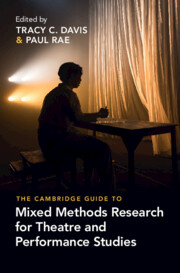Book contents
- The Cambridge Guide to Mixed Methods Research for Theatre and Performance Studies
- Reviews
- The Cambridge Guide to Mixed Methods Research for Theatre and Performance Studies
- Copyright page
- Contents
- Figures
- Tables
- Contributors
- Acknowledgements
- Introduction:
- Part I Planning
- Part II Doing
- Part III Interpreting
- Chapter 11 Methodologies Dialogue:
- Chapter 12 Non-linear Methodologies for Researching Early Modern Performance:
- Chapter 13 Taking Your Time:
- Chapter 14 Not Here for the Disciplines:
- Chapter 15 Methodologies Dialogue:
- Conclusion:
- Index
- References
Conclusion:
The Aesthetics of Performance Research – Appearance, Conduct, Design
from Part III - Interpreting
Published online by Cambridge University Press: 01 February 2024
- The Cambridge Guide to Mixed Methods Research for Theatre and Performance Studies
- Reviews
- The Cambridge Guide to Mixed Methods Research for Theatre and Performance Studies
- Copyright page
- Contents
- Figures
- Tables
- Contributors
- Acknowledgements
- Introduction:
- Part I Planning
- Part II Doing
- Part III Interpreting
- Chapter 11 Methodologies Dialogue:
- Chapter 12 Non-linear Methodologies for Researching Early Modern Performance:
- Chapter 13 Taking Your Time:
- Chapter 14 Not Here for the Disciplines:
- Chapter 15 Methodologies Dialogue:
- Conclusion:
- Index
- References
Summary
Paul Rae concludes the volume by reflecting on why it is so hard for performance scholars to write about method and methodology. He proposes that the inherently aesthetic and performative dimensions of research practice mean that performance scholars can struggle to articulate a discourse on method that exists independently. He draws on examples from across the volume, as well as on his own research experience, to consider a particularly challenging (and fruitful) area of complexity in performance research: the aesthetics of research activity. By discussing the moments when the researcher becomes subsumed into the events of practices being researched, aesthetic conduct in research, and the aesthetic qualities of research design, he argues that it is only when performance researchers can better account for the integration of research activity and what is being researched, that they can arrive at a more robust account of method and methodology.
- Type
- Chapter
- Information
- Publisher: Cambridge University PressPrint publication year: 2024

